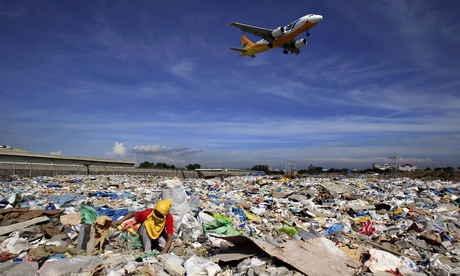The Canadian firm transforming your sofa into biofuels
Enerkem's waste-to-energy technology is giving old clothes and sofas a new lease on life as a source of renewable energy
The Guardian
Elisabeth Braw
June 16, 2014

New technology is breaking down waste to produce renewable technology, plastic chemicals and ethanol. Photograph: Romeo Ranoco/Reuters
In Edmonton, Canada, something as mundane as municipal waste treatment is attracting worldwide attention. The waste is the same as at municipal waste plants around the world – shoes, sofas and other items that can't be recycled and are destined for landfills or incinerators – but the fate that awaits Alberta's garbage is different: as of this month, it's being turned into biofuels.
"We use heat and pressure to break down the materials that usually end up in the landfill", explains Vincent Chornet, chief executive of Enerkem, the company behind the technology. "We then turn it into methanol and ethanol. In total, the process from waste to final product takes about four minutes."
Enerkem's technology, performed on 15 different categories of rubbish at extremely high temperatures, produces renewable electricity, chemicals for plastic and of course, ethanol for cars.
Renewable energy from non-recyclable rubbish, all in a matter of several minutes? It sounds too good to be true. "It's a game-changer", says Chornet. "Waste is now an opportunity." Montreal-based Enerkem's contract with the city of Edmonton includes treatment of 100,000 tonnes of garbage annually for 25 years. That, reports Enerkem, will yield 138m litres of ethanol per year, enough to fuel 400,000 cars driving on a 5% ethanol blend.
But what seems like a magic wand for garbage and renewable fuels is the result of 10 years of experimentation by Enerkem, which holds the patents behind the technology. And, everything that helps us to reduce garbage is good, says Dr Olle Olsson, a research fellow at the Stockholm Environment Institute who specialises in renewable energy markets. "In garbage treatment, there's a hierarchy", he explains. "At the top is reuse, which means the garbage doesn't enter the garbage stream. Then comes recycling, and then comes burning the garbage to get energy."
Sweden is a leading practitioner of the fast-growing sector of garbage to energy. According to Avfall Sverige, the association of waste management companies and agencies, environmentally friendly energy from garbage heats 810,000 Swedish households. Not only that: the lowly rubbish also produces enough electricity for 240,000 Swedish family homes. That's the equivalent of more than 1m litres of oil per year. The average Swede produces 237.6kg of non-recyclable garbage each year, according to the association, of which 49% is burned and used as energy.
But that's not enough. Sweden's rubbish to energy market is so hot that the country's 30 rubbish-based power plants have to import waste from other countries, including Britain. "Garbage from England keeps us warm during the winter", says Olsson. Sweden now has to import some 750,000 tonnes of garbage each year, and it's an unorthodox form of import, where Swedish waste to energy companies don't have to pay for their goods. Instead they're paid around £40 per tonne for taking care of other countries' refuse.
According to energy and development consulting firm Coffey, Sweden is the EU's second-ranked waste to energy nation, topped only by Denmark, which burns 54% of its waste for energy production. France has more waste to energy plants than any other country in the world - 127 in total – while the US operates 86. Austria and Germany are the EU's top recyclers at 69% and 65%, respectively.
Thanks to Enerkem's renewable fuel technology, that waste to energy ratio may well increase. Chornet won't reveal which cities will next introduce its technology, but says the company is actively interested in the UK thanks to the country's biofuel legislation. The EU has set a target of 10% biofuels (as a share of all fuel consumption) by 2020, which its member states are obliged to follow. Britain currently imports nearly 80% of its biofuels and is working to increase production within the UK.
"What we're seeing with the plant in Edmonton is a first step towards a large-scale waste to renewable fuels technology", says Olsson. "But we mustn't forget that these are complicated chemical processes. It's not easy to get ethanol out of nappies."
Still, getting ethanol from waste rather than importing the energy is a positive development, he adds, "but by itself it will never replace imports."
If garbage is so useful as a source of biofuels, especially at a time when rising food prices are forcing countries to reconsider food-based ethanol, isn't there a risk that consumers start producing voluminous amounts, knowing that doing so may even lessen their country's dependence on foreign oil and gas? Yes, says Olsson: "In an ideal world we should reduce our garbage, but turning it into energy reduces the customer's incitement to do so."
Still, even Chornet agrees that recycling beats rubbish-based biofuels.
